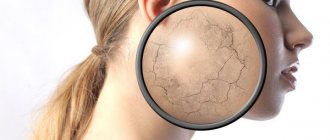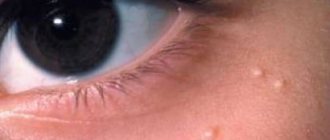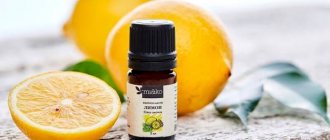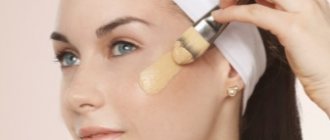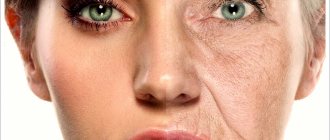Causes of skin dehydration
Before solving the problem of dehydration, it is necessary to find out what could provoke excessive evaporation of moisture in the skin cells of the face:
- The presence of dermatological diseases that contribute to drying of the skin.
- The onset of severe cold.
- The presence of hormonal and infectious diseases, as well as disturbances in the functioning of the gastrointestinal tract and urinary system.
- Aggressive influence of the external environment.
- Long-term use of medications (antibiotics, diuretics or laxatives).
- Active sweating processes.
- Incorrect selection of cosmetic products for facial dermis care.
- The appearance of age-related changes (from 50 years).
- The presence of bad habits, in particular excessive drinking and smoking.
- Unbalanced diet.
- Improper drinking regime, consumption of drinks with a dehydrating effect (tea, coffee, carbonated water, alcohol, etc.).
If nothing is done about dehydration, a significant deterioration in the general condition of the skin and the occurrence of dermatological diseases is possible.
Signs of dehydrated skin
Dehydration can affect owners of both dry and combination and oily skin. The problem can manifest itself at any period of life, so it is important to know the differences between direct dehydration and temporary drying of the dermis:
- Regular discomfort.
- Feeling of drying out of the epidermis.
- The skin rapidly loses its elasticity.
- The skin constantly feels tight, especially after washing and applying cosmetic products.
- Coarsening of the facial dermis.
- The appearance of redness on the face.
- Formation of wrinkles and fine lines on the facial skin.
- The appearance of spots that actively peel off.
- Periodic severe itching of the skin.
Dehydrated facial skin is often mistaken for dry skin, but this is absolutely wrong. The difference between these dermal conditions is that dryness is caused by insufficient sebum production, and dehydration is caused by a lack of moisture. That is why dehydration can affect not only dry, but also oily and combination dermis.
The main sign of dehydration is peeling of the tip of the nose and corners of the lips (if the skin is dry or normal) or the forehead, chin and wings of the nose (if the skin is oily or combination).
Home remedies to combat dehydration
Most often, moisture deficiency is noticed on the cheeks, forehead and around the eyes.
Dry skin types should be distinguished from dehydrated skin types. Dry dermis experiences constant nutritional deficiency. Sebum is not produced enough due to improper functioning of the sebaceous glands. The problem affects all layers of the epidermis. Dry skin needs nutrients first, then hydration. Dehydration is a temporary condition of the skin due to a lack of moisture in the stratum corneum. This condition is the result of a thinning of the lipid layer that holds water molecules. Without it, tissues quickly evaporate moisture, transepidermal water loss occurs.
Note! Moisture deficiency can be characteristic of any skin type: dry, oily, combination.
Common signs of dehydration:
- constant peeling;
- tightness after washing, removing makeup;
- rough structure;
- more pronounced facial wrinkles;
- flabbiness;
- uneven complexion.
For normal and combination (prone to dry) skin types:
- roughness on the tip of the nose, cheeks, and corners of the mouth;
- dull complexion.
For oily and combination (prone to oily) skin types:
- peeling on the forehead, wings of the nose, chin;
- a feeling of tightness, despite the oily sheen;
- increase in enlarged pores;
- grayish pale tint.
Which skin type suffers more from moisture deficiency?
Note! Contrary to popular belief, it is oily, not dry, skin types that most often suffer from dehydration.
Due to its oily sheen, it is subjected to constant cleansing with mattifying and drying care products. Alcohol-containing products and scrubs have a particularly strong effect. Aggressive care provokes even more sebum secretion. As a result, the dermis begins to dehydrate, loses moisture, nutrition and tries to actively restore the lipid layer.
One of the signs of a lack of moisture in oily and combination skin is the immediate absorption of moisturizing components of creams. Because of this, the foundation rolls off, since only the pigment remains on the surface of the face.
Moisture deficiency is determined by the presence of signs:
- dull complexion;
- flabbiness;
- loss of elasticity;
- peeling;
- roughness to the touch;
- enlarged pores;
- constant discomfort;
- redness;
- itching;
- feeling of tightness;
- the appearance of fine wrinkles.
Dehydration of oily skin provokes intense production of sebaceous secretions. The face becomes shiny, inflamed, covered in rashes, and the pores become clogged. The foundation slides off quickly and clogs creases. Fabrics absorb moisture from the product, leaving pigment on the surface.
Dry skin resembles tissue paper and is very flaky. Scales appear on the cheekbones, tip of the nose, and corners of the mouth. Fine wrinkles on the face deepen.
There are several reasons for moisture loss. External factors play a greater role than internal ones. The upper layer of the epidermis has a layer consisting of lipids. These cells perform a barrier function, protecting the epithelium from negative environmental factors. The lipid layer holds water molecules.
Oily and combination skins are cleaned with aggressive cosmetics. Alcohol, concentrated acids, sodium lauryl sulfate gradually weaken the protective barrier.
The loss of moisture in tissues is caused by:
- improper care of dehydrated skin (use of alcohol-containing products, abuse of peelings, scrubs, hardware procedures);
- stress;
- avitaminosis;
- depleting unbalanced diet;
- insomnia;
- overwork;
- washing with soap and chlorinated water.
In summer, the face is exposed to sunlight every day. Long walks in the open sun and trips to the beach increase the evaporation of water from the surface. Indoors, the situation is aggravated by air conditioners that dry out the air.
In winter, heating devices operate, which also reduce humidity, which inevitably affects the condition of the integument. The epithelium becomes like thin paper, loses its healthy color, flakes off, and becomes covered with a network of fine wrinkles. To smooth out wrinkles, it is enough to provide proper care for dehydrated skin.
Internal reasons
Dehydration may be a sign of problems with internal organs. A similar symptom occurs after intestinal infections accompanied by diarrhea and vomiting.
Vegetable oils perfectly moisturize and nourish the epithelium. Sesame, olive, wheat with the addition of 1-2 drops of essential oil are useful. Homemade masks will help you cope with the problem. It is recommended to apply the compositions 1-2 times a week, leaving for 20 minutes:
- carrot. Grind the root vegetable on a fine grater, mix with egg yolk;
- tomato Pass the fresh tomato pulp through a sieve, add 1 tbsp. lie starch, 5 drops of olive oil;
- cucumber Squeeze the juice of fresh vegetables, add 2 tbsp. lie heavy cream, 20 drops of rose water;
- curd. Mix cottage cheese, milk, carrot juice, olive oil in equal proportions;
- sour cream Grind lemon zest with yolk, 1 teaspoon. olive oil, 100 ml sour cream.
Following simple rules will help prevent skin dehydration:
- Run a humidifier at night. The next morning, your face will be pleased with its natural radiance and noble shine. Make sure the humidity level stays around 60–70%. Then the applied cream will absorb moisture from the environment.
- Drink at least 1 liter of water per day, preferably two. Distribute the recommended amount of fluid throughout the day. Drink slowly in small sips as you become thirsty.
- Wash with mineral, distilled or melt water. Avoid washing your face with tap water. In addition to bleach, it contains metal impurities.
- Cleanse your face with micellar water, milk or toner. Do not get carried away with foams, washing gels, soaps, scrubs, lotions containing alcohol.
- Maintain optimal cellular moisture balance. Use serums and creams regularly. Make nourishing masks occasionally.
- Visit your cosmetologist promptly. Peels, hardware cleanings, injections and other salon procedures are useful in moderation.
- Protect your face from ultraviolet radiation. Spending a lot of time in a solarium is harmful. And unnatural tanning has long gone out of fashion. In spring and summer, apply sunscreen to your face and exposed areas of your body before going outside.
It is important not only to overcome the lack of moisture using external therapy methods. The stable functioning of the whole organism plays an important role in the health of the integument. You need to improve your metabolism, monitor your diet, take vitamins as needed, give up bad habits, avoid stress and overwork.
We suggest you familiarize yourself with Which ointment to treat acne on the face
Only comprehensive care for dehydrated skin will help restore the lipid layer. It will restore elasticity, smoothness, natural radiance, and protect against premature wrinkles.
Care instructions
By following the rules for caring for dehydrated facial skin, you can restore moisture balance and avoid relapse. The following care tips are suitable for all skin types:
- Maintain a drinking regime in order to normalize the water balance of the whole body. Drink at least 1.5 liters of clean water during the day, while minimizing the consumption of hot and dairy drinks. It is better to exclude alcohol and soda.
- Protect your facial skin from negative environmental influences, in particular dust, hazardous substances and vapors, and high temperatures.
- Include more vegetables and fruits in your diet. Avoid fatty, fried and pickled foods.
- Lead a healthy lifestyle, without going to the solarium or sauna. Get at least 8 hours of sleep a day.
- Do not ignore any dermatological diseases.
- Pay special attention to the choice of decorative cosmetics. For dehydrated dermis, it is best to purchase care products with a moisturizing effect.
It is advisable not to get carried away with applying a large amount of makeup to your face, since decorative cosmetics, in particular foundation, only further emphasize the symptoms of dehydration.
How to care for dehydrated skin
You can prevent moisture loss at home. First, it is important to stop the thinning of the lipid layer. After all, lipids are the only natural barrier of the epidermis. Protects against ultraviolet radiation and airborne toxins.
Cleansing
Caring for dehydrated skin begins with proper cleansing. Gentle products without aggressive surfactants or alcohol are suitable. Such products also damage the lipid layer, but are gentler than cosmetics with sulfates.
Exfoliation
Dead scales must be removed regularly. After all, unexfoliated particles clog pores and intercellular space. Prevents full absorption of moisturizers. Products with AHA acids are suitable. These substances dissolve dead cells and retain water. It is recommended to give preference to mild tonics without alcohol. There are lotions for the care of dry, oily and combination dehydrated skin.
Hydration
Layering is most effective in combating moisture deficiency. Applying certain products one at a time allows you to quickly return your face to a healthy appearance:
- First, a water-based serum is applied to a cleansed face that is still damp after applying tonic. There are products that are suitable for all types. The composition must contain a moisturizing component - hyaluronic acid, glycerin. They instantly replenish moisture loss, eliminate the feeling of dryness and tightness. Peeling goes away in 2-3 days.
Women over 35–40 years old should buy anti-aging cosmetics with antioxidants. The substances stimulate the synthesis of hyaluronic acid by cells. Increase the production of collagen and elastin proteins, protect against the effects of free radicals.
- To retain moisture in the epidermis, immediately after the serum, apply cream or cosmetic oil for the face. The oily texture envelops the skin and prevents the evaporation of water molecules. Such a barrier is silicone contained in creams. Vitamins E, C, B nourish the dermis from the inside. Elastin and collagen restore tone.
Use the cream 1–2 hours before bedtime. The product will have time to be absorbed and will not leave stubborn stains on clothes or bed linen. If the cream is oily, then pat your face dry with a clean napkin before going to bed.
Toning
Keep a thermal water spray in your purse. In the office, store, transport, or while walking, refreshing irrigation will compensate for moisture loss. It is not advisable to apply water over foundation. The product will spread and clog the pores.
Nutrition
Masks are useful every week. Nutrient compositions saturate with vitamins, restore, prevent dryness and the appearance of wrinkles. It is not recommended to use clay masks. Tightening agents irritate and aggravate peeling.
Dry dehydrated dermis
Dry and dehydrated facial skin especially needs care, otherwise wrinkles and folds may actively appear on the face. Owners of such problematic dermis need to learn the following rules:
- Drink 2 liters of water daily. Start your day with a glass of water on an empty stomach. You should also drink water half an hour before and after meals. Never drink water immediately before bed, otherwise swelling will appear the next day.
- Regularly refresh and tone your skin. This can be done using a bottle of thermal water, which should be sprayed on the face at any time of the day.
- Dehydrated and very dry facial skin requires systematic moisturizing. To do this, choose a face cream with a moisturizing effect, containing hyaluronic acid, vitamins, as well as collagen and elastin.
It is important to regularly make nourishing masks, which can be prepared in the following ways:
- Add yeast (ten grams) and whipped egg white to cabbage juice (thirty milliliters). Distribute the mixture over the entire surface of the face and leave it for a quarter of an hour, then remove with water.
- Mix melted honey and dry milk (ten grams each) in equal parts and add a little water to them. Leave the finished product on your face for about 15 minutes.
- Pour crushed oatmeal (one hundred grams) with hot milk (one hundred milliliters) and mix with vegetable oil (fifteen milliliters). The mask exposure time is 20 minutes.
It is necessary to perform moisturizing masks for dry skin at least 2 times a week. The first results will be noticeable after just a few procedures.
Moisture retention mechanism
On the surface of the skin there is a stratum corneum. Its moisture is provided by cellular structures and lipids located between them (fat layer), which perform several functions:
- they act as a bonding agent for intercellular structures;
- prevent moisture loss;
- regulate the rate of skin peeling and cell renewal;
- Thanks to their antimicrobial action, they play a protective role on the surface of the epidermis.
In normal skin, there is a certain balance between the water content in the stratum corneum and in the surrounding air due to the work of the sebaceous glands; if it is disturbed, dry facial skin appears or, conversely, oily.
The water-lipid emulsion film that forms on the surface of the epidermis also contributes to moisture retention. It is formed from secretions of sweat and sebaceous glands and intercellular lipids. An emulsion may have different ratios of components. This depends on external conditions and the intensity of the glands.
Oily dehydrated dermis
Oily, dehydrated skin, unlike dry skin, has overly enlarged and clogged pores and comedones. There are times when, even when moisturized with cosmetics, dry, oily skin still retains signs of dehydration.
Caring for oily, dehydrated skin using folk remedies:
- Dilute white clay (fifty grams) with water to a thick consistency, then pour tea tree oil (three drops) and olive oil (fifteen milliliters) into it. Apply a thick layer to your face and leave for 15 minutes.
- Beat the chicken protein well, add melted honey (thirty milliliters), tea tree oil (one drop) and squeeze lemon juice (ten milliliters). Apply the mask to your face with massage movements. Exposure time – 5 minutes.
- In equal proportions, combine natural yogurt with oatmeal (fifty grams each). After distributing the product over your face, give it a light massage. This cleansing mask is perfect for everyday use.
- Pre-prepare and cool the chamomile-based decoction. Pour rose water (forty-five milliliters) and lemon juice (fifteen milliliters) into it. The finished emulsion is used as a tonic for oily dermis of the face.
Home remedies will not only moisturize oily, dehydrated facial skin, but also cleanse and tighten pores, eliminate inflammatory processes, normalize the hydrolipid balance, and also make the skin tone uniform and fresh.
Reviews
Nika. A favorite recipe for moisturizing the skin is to pick an aloe leaf, grind it in a blender, apply to the face for 15 minutes, rinse and apply a light cream. Zhenya. In the summer, I periodically make a cucumber mask - cut it into circles and apply for 5 minutes. I don't wash my face. The skin becomes soft.
Faith. I prefer ready-made masks. My favorites are Vishy, Estee Lauder, Avene.
Lana. Once I tried to lubricate my face with aloe pulp - an allergy began. To moisturize the skin, I use a mixture of oatmeal and kefir, and I also like a mask of strawberries and sour cream.
Keeping your skin hydrated is an important task for every woman. When there is a lack of fluid in the dermis, the physiological processes responsible for the absorption of nutrients and cellular respiration slow down. As a result, tissue trophism deteriorates, the elasticity of the integument decreases, they become dull and covered with wrinkles. To maintain water balance, it is necessary to regularly apply moisturizer to the skin, use folk remedies or ready-made masks, as well as eat a balanced diet and drink plenty of fluids.
Cosmetical tools
Cosmetic products for dehydrated facial dermis should be selected depending on its type. The most popular and effective means:
- Moisturizing cream-gel for dry, dehydrated skin from Mixa. It has a light gel-like consistency. The gel is instantly absorbed into the skin of the face, supplying it with missing moisture and nutrients, combats dryness, and stimulates the production of collagen and elastin.
- Smoothing mask for dehydrated skin from Eveline Cosmetics. It has 3 effects - moisturizing, nutrition and rejuvenation. This mask is suitable for any type of dermis and does not cause any discomfort.
- Oil for dehydrated facial skin from Clarins Paris. Effectively moisturizes the dermis, regulates the water level in skin cells, and normalizes the regeneration process. The oil improves the tone and texture of the face, increases skin tone.
- Cream for dehydrated facial skin with vitamins from Pro You Professional. The product not only saturates the skin cells with moisture and normalizes hydrobalance, but also supplies the dermis with essential vitamins and strengthens its protective properties.
- Set for dehydrated facial skin from La Roche-Posay. Consists of moisturizing cream and micellar liquid. Perfect for combination and oily skin. Restores hydrolipid balance and elasticity, prevents irritation, and also eliminates the feeling of tightness. The product is recommended for use on clogged pores.
Special attention should be paid to the choice of foundation. The wrong product will only emphasize dehydration of the skin. If there is a lack of moisture, the best foundation is from Dermalogica, BB cream from Isadora, moisturizing tone from Kryolan, Perfect Radiance foundation from L'Oreal Paris, CC Cream from Roseliane.
What should be included?
It is important to know what components of creams to look for on the packaging. Unfortunately, you can’t always believe the “moisturizer” label.
- Hyaluronate. The fact is that the amount of hyaluronic acid that our body produces decreases not only with age, but also under the influence of external or internal pathogenic factors. Using a product containing it, you can correct the situation.
- Glycerin is similar in action to hyaluronic acid. It not only moisturizes the skin well, but also creates a permeable film on the surface that prevents moisture evaporation.
- Vegetable and mineral oils. They soften the epidermis, improve general condition, promote regeneration processes, eliminate irritation and peeling. If you have oily epidermis, you need to be very careful when choosing products containing such substances. They can clog pores, provoke inflammation, acne, and blackheads.
- Collagen, coenzyme, elastin help restore the fibers of the epidermis and dermis. Skin elasticity increases, elasticity and structure improves.
- Plant extracts, vitamin and mineral complexes are beneficial for the skin. They provide nutrition, improve internal processes, and stimulate cell function.
We invite you to familiarize yourself with Anti-wrinkle cream for men, rating of products after 30, 40, 50 years
How to find the right one? We help you make your choice.
